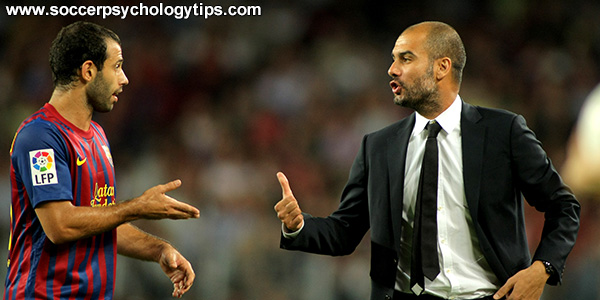
How to View Coach Criticism as a Positive Message
Criticism from coaches can be a muddled message for some soccer players.
Too often, the message from a coach gets lost in its delivery or emotion.
Loud or negative language can be internalized as an indictment on your abilities as a player.
When coaches give negative criticism, especially if it is done so in an excessively loud manner, soccer players may miss the message and focus on the negative part of the message.
For example, if a coach yells, “What the heck are you doing, I told you to stay back on defense.” You might internalize the message as, “You don’t do anything right.”
…Or if you get pulled from a game and your coach says, “I’m tired of you making bad passes.” You might hear the message, “You are not good enough to play.”
…Or if your coach says, “If you came to practice more often, you would be in better shape and be able to get to the ball quicker.” You might internalize the message as, “You are too heavy,” or, “You are slow.”
Let’s be real… Some soccer coaches are not the best communicators. In fact, some coaches aren’t even positive coaches.
These coaches may think their message is a way to motivate and help you to improve your game but have no idea how to communicate that message effectively.
It is difficult, at times, to not take harsh criticism and demeaning language personally.
You can’t control the message from your coach or even how the message was presented, but you can learn how to sort through language and tone in order to extract something of value that can improve your game.
This is not an easy task but is essential if you are to advance your game and maintain your passion for the game.
The goal is to objectively wade through the message… throw away the trash or the negativity and harshness and look for the positive message (something that you can work on to improve your game).
For example, if your coach yells out, “How many times can you make the same stupid mistake of not clearing the ball?”
Instead of internalizing the word “stupid” as “you are stupid,” ask yourself an objective question and respond with an objective answer:
“Am I stupid? No, I’m a pretty sound defender but I can still improve my game. Instead of settling the ball and dribbling the ball out of danger, I should immediately clear the ball up-field out towards the sidelines.”
The goal is to not take the message personally and extract a beneficial tip that you can work on in practice.
Take for instance Chelsea midfielder Eden Hazard…
Hazard has recently received criticism from his coach, after a 2-0 loss to Arsenal, stating that Hazard and some of his teammates are “extremely difficult to motivate.”
Instead of internalizing that comment, Hazard brushed off his coach’s comment and bounced back in the very next game scoring his 13th goal of the season and helping Chelsea win their semifinal match up against Spurs.
HAZARD: “I don’t have a problem with it at all. The manager thinks what they want to think. For me, the best response is to be on the pitch and to win games. I did it.”
It can be very difficult to not take coach’s comments personally.
You can’t control what your coach says or how he says it but you can control how you respond to it.
Coping With Criticism From Coaches:
Be objective. Ask yourself, “Is there anything in this communication that can help my game?”
If yes, create a plan to improve that part of your game. Try not to take coach’s comments personally–as an attack on your person.
If you can leave out the emotion of coach’s instruction, you can use the instruction as advice rather than negative judgments.
Related Sports Psychology Articles
- How to Anticipate and Cope During Soccer Games
- How to Cope with Pregame Nerves in Soccer
- How to Cope with Nervousness in Soccer
- Subscribe to The Sports Psychology Podcast on iTunes
- Subscribe to The Sports Psychology Podcast on Spotify
Download a free sports psychology report to improve your mental game!
Learn more about our one-on-one mental game coaching.
Get the Mental Edge – With Mental Training

Do you perform well in practice, but find yourself under-performing in games? Do you doubt your skills and second-guess yourself under pressure? If so, mental training will help you reach your goals in soccer. Many soccer players have the skill but are held back by low confidence and lack of pregame mental preparation!
You can get expert mental coaching with us from anywhere. Meet with us via Zoom, Skype, FaceTime or phone call. With today’s video technology, we are able to connect with athletes and coaches all over the globe.
Call Us Today to Schedule Your Free 15-Minute Session.
Find Out How You Can Benefit From One-on-One Mental Coaching!
888-742-7225 | 407-909-1700
